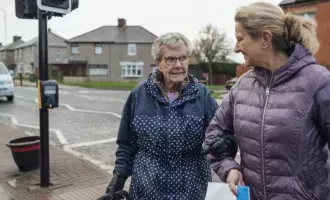Our expert emergency call agents make sure that out-of-hours callers to Barking and Dagenham council, including the most vulnerable citizens, get quick and reliable help, no matter when they need it.
We’ve reduced costs and simplified procurement for the council, without compromising on service quality, through a national contract that makes our specialised emergency call handling team and proven technology available to local councils.
When there is danger to life or limb, local authorities, housing associations and other public sector providers have a duty of care to provide support to citizens, such as emergency homelessness, social services support, housing repairs or issues, flooding and highway incidents. Unfortunately, emergencies don’t keep office hours. Many of these calls come in out of hours, and it can be difficult for local authorities to find capacity within their own teams to answer these sensitive and urgent calls accurately, reliably and cost-effectively, 24/7.
So, when the London Borough of Barking and Dagenham’s contract for out-of-hours customer service came up for review in January 2020, Head of Customer Contact Natalia Monvoisin knew this was an opportunity to improve the quality and responsiveness of a vital service for citizens. She decided to join the national multi-partner out-of-hours partnership, led by Ealing Council and delivered by Capita Public Service. This meant she could deliver a quality out-of-hours service in the borough, improve efficiency and avoid an extensive procurement process.
In just 18 months, our team of highly skilled and experienced out-of-hours customer service agents have answered more than 18,000 calls to the council. More than half of those calls were related to social services and emergency homelessness and affected the most vulnerable in the borough. We also answer emergency calls for other services on behalf of the council, including emergency planning, terror threats, noise and nuisance and highways emergencies.
The emergency response team answers calls when the council offices are closed, following carefully crafted call handling scripts and workbooks that ensure callers get the right help, no matter who they talk to or what service they need. If the call is deemed an emergency, the team passes the case data to support officers at the council to provide immediate support to the person in need. We continuously review our processes and outcomes with the council’s service leaders and update our call centre scripts in line with changing legislation or local challenges to ensure we can respond to the unpredictable customer demand.
Key to the success of our engagement was a quick onboarding process that allowed us to start delivering the service quickly and effectively for the council and citizens. We followed our established processes for best-of-breed call centres, using tried-and-tested call scripts that were devised for similar clients. We also held dedicated workshops with teams from the council to understand the technicalities and core requirements of the service and to develop the tailored scripts needed to make sure calls were responded to accurately and effectively, and in line with council policies and procedures.
In addition, our state-of-the-art technology has given the council:
- streamlined and simplified call processes that keep call times as short as possible for the caller and reduce costs
- automated escalation procedures to ensure that each service request is addressed and that end-to-end processes are completed
- a dedicated customer portal where council staff can listen to calls or download reports
- a full audit trail of all system and user activity for all enquiries logged on the system, enabling effective performance management and complaint handling.
The implementation was a huge success: the new service was rolled out quickly with no adverse impact on end users or council staff during the switchover, and all project goals were achieved within three months. The new service is well embedded into the council’s processes and meeting all its KPIs. Importantly, the call abandon rate has been reduced and there has been a dramatic reduction in non-emergency customer contact, saving the council nearly £2,000 per month since March 2020.
Natalia says she was particularly pleased with our “open lines of communication, reports coming through as agreed and clear testing” She says; “I have found this to be one of the easiest switchovers for a contact centre.”
So, what’s next? We’re committed to ongoing, continuous improvement and cost efficiencies, and for the council to benefit from ongoing system upgrades. Potential changes include moving from phone call to emails for some types of queries and reducing non-emergency contact further.
You may also be interested in
Nobody should ever feel stuck when they need help. Our out of hours customer service partnership provides 24/7 emergency support.








